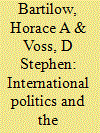|
|
|
Sort Order |
|
|
|
Items / Page
|
|
|
|
|
|
|
| Srl | Item |
| 1 |
ID:
087727


|
|
|
|
|
| Publication |
2009.
|
| Summary/Abstract |
The "Americanization" of the global drug war is now synonymous with the global expansion of the United States (U.S.) Drug Enforcement Administration's (DEA) drug enforcement operations in foreign countries. Recent research posits that the rise in violent crime in Latin America is the "collateral damage" of the "Americanization" of drug enforcement in the region. However, the causal inference of the "collateral damage" thesis is biased because drug enforcement and violent crime in Latin America are endogenously related. This research corrects this bias in two ways. First, we collect data for cases to which the endogenous bias does not apply. Namely, we ask what effect does the operations of the DEA, specifically trafficker immobilization and drug interdiction, have on violent and property crimes in Central American and Caribbean countries where drug producing cartels and narco-insurgent organizations are not indigenous to the political landscape? Second, we estimate the data via a structural equation model. The results lend support to the collateral damage hypothesis. The DEA's coordinated drug enforcement operations contribute to increasing the level of violent and property crimes in the region.
|
|
|
|
|
|
|
|
|
|
|
|
|
|
|
|
| 2 |
ID:
087706


|
|
|
|
|
| Publication |
2009.
|
| Summary/Abstract |
The "Americanization" of the global drug war is now synonymous with the global expansion of the United States (U.S.) Drug Enforcement Administration's (DEA) drug enforcement operations in foreign countries. Recent research posits that the rise in violent crime in Latin America is the "collateral damage" of the "Americanization" of drug enforcement in the region. However, the causal inference of the "collateral damage" thesis is biased because drug enforcement and violent crime in Latin America are endogenously related. This research corrects this bias in two ways. First, we collect data for cases to which the endogenous bias does not apply. Namely, we ask what effect does the operations of the DEA, specifically trafficker immobilization and drug interdiction, have on violent and property crimes in Central American and Caribbean countries where drug producing cartels and narco-insurgent organizations are not indigenous to the political landscape? Second, we estimate the data via a structural equation model. The results lend support to the collateral damage hypothesis. The DEA's coordinated drug enforcement operations contribute to increasing the level of violent and property crimes in the region.
|
|
|
|
|
|
|
|
|
|
|
|
|
|
|
|
| 3 |
ID:
072696


|
|
|
|
|
| Publication |
2006.
|
| Summary/Abstract |
Previous research indicates that a country's international commerce usually tracks the pattern of its diplomatic entanglements. As the evidence for this observation comes from overall trade statistics, however, analysts have had little ability to probe the sources of the linkage. This study uses major-power trade data from 1962 to 1997, disaggregated by economic sector, within an elaborated 'gravity model' that parses out some of the potential causal paths. Our results indicate that, while (1) commercial exchanges among major powers did 'follow the flag' (2) within all sectors during the period under study, not only those with immediately military value, (3) national traits that are causally prior to foreign relations, but often excluded from studies of international trade, also predicted trade in each sector, and (4) the major-power democracies did not show any particular favoritism to each other after these national differences in trade activity are considered.
|
|
|
|
|
|
|
|
|
|
|
|
|
|
|
|
| 4 |
ID:
087576


|
|
|
|
|
| Publication |
2009.
|
| Summary/Abstract |
Democracies trade more with other democracies than they trade with closed political systems, but why they do so is unclear. We present a "gravity equation" that disentangles foreign policy from country-specific influences on trade by adding explanatory variables to control for traits of both the mass public and the domestic political system. We apply the resulting model to a data set covering 50 years (1948-1997) and 72 countries. The estimated effect of joint democracy, which appears in the absence of the country-specific variables, drops out when these control variables are added to eliminate omitted variable bias. Democracies do not trade together any more than they would incidentally given the usual social, economic, and political influences on commercial activity, calling into question explanations for their mutual trade activity that rely on foreign-policy favoritism or institutional compatibility.
|
|
|
|
|
|
|
|
|
|
|
|
|
|
|
|
|
|
|
|
|